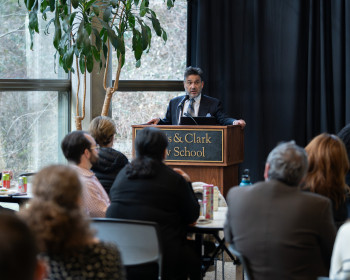Bringing Life to the Theoretical
Open gallery

Bald Eagles, birds and snakes joined Professor Erin Ryan’s Natural Resources Law class this spring. Ryan took her law class on a field trip to the Tualatin River National Wildlife Refuge to bring to life the theoretical concepts the students were learning in class.
“We obviously talk a lot about all this in the abstract in the classroom, but I think it’s invaluable to get out of the abstract and into the real world on all this,” said Ryan.
Julia Fraser, a second-year law student said the field trip was a great way to remind her of the practical application of what she learned in class - that there is more than what will be on the bar exam – that being a lawyer is working to solve real problems affecting real people.
The class hiked around the refuge, which includes a small oak savannah, the Tualatin River channel, and an expansive seasonal marsh. They spent a long time discussing the marsh and how the refuge went about obtaining the land and water rights to flood the land. The class discussed other concepts like public land management for ecosystem services protection, species preservation, wetland and issues of local-state-federal management cooperation/conflict.
Derek Mills, a third-year law student said, “These types of experiences are invaluable for students of natural resource law. As law students, we spend countless hours in the classroom and in the library eyes affixed to a computer screen reading about birds, snakes, trees, and wetlands…field trips like this one help students remember why they came to law school in the first place. A periodic grounding can go a long way.”
Also joining the field trip were area attorneys, scientists, and environmental consultants that work on the refuge. The experts were Kim Strassburg, Manager of Visitor Services at the Refuge, Pete Schmidt, Refuge Wildlife Biologist, Steve Burke, an attorney who litigated Refuge-related wetland issues on behalf of the Friends of the Tualatin River, Paul Whitney, an ecologist involved in local watershed issues on behalf of the Tualatin Riverkeepers and Sam Jackson, an environmental engineer who has worked in both state government and private consulting.
“Speaking with industry professionals provides a perspective that law students often take for granted. The institutional knowledge retained by these professionals is astounding, and being able to take advantage of that knowledge, if only for an afternoon, is important,” said Mills.
Throughout the field trip the students got a chance to walk side-by-side with the professionals and ask questions specific to the refuge management. Ryan said her students were especially interested in how management efforts are complicated by the various criteria of different local, regional, state, and how the refuge works with local NGO’s who occasionally lobby in Washington. Besides quality time out in the field with professionals, the field trip gave the students a chance to bond with fellow classmates.
“Being outside the traditional teacher centered environment created a more open forum for discussion, for asking questions, and for interacting with classmates,” said Fraser, “I think it was nice to see classmates face-to-face, rather than just in our seats across the room.”
More Newsroom Stories
Law Communications is located in room 304 of Legal Research Center (LRC) on the law Campus.
MSC: 51
email jasbury@lclark.edu
voice 503-768-6605
Cell: 626-676-7923
Assistant Dean,
Communications and External Relations, Law School
Judy Asbury
Law Communications
Lewis & Clark Law School
10101 S. Terwilliger Boulevard MSC 51
Portland OR 97219


